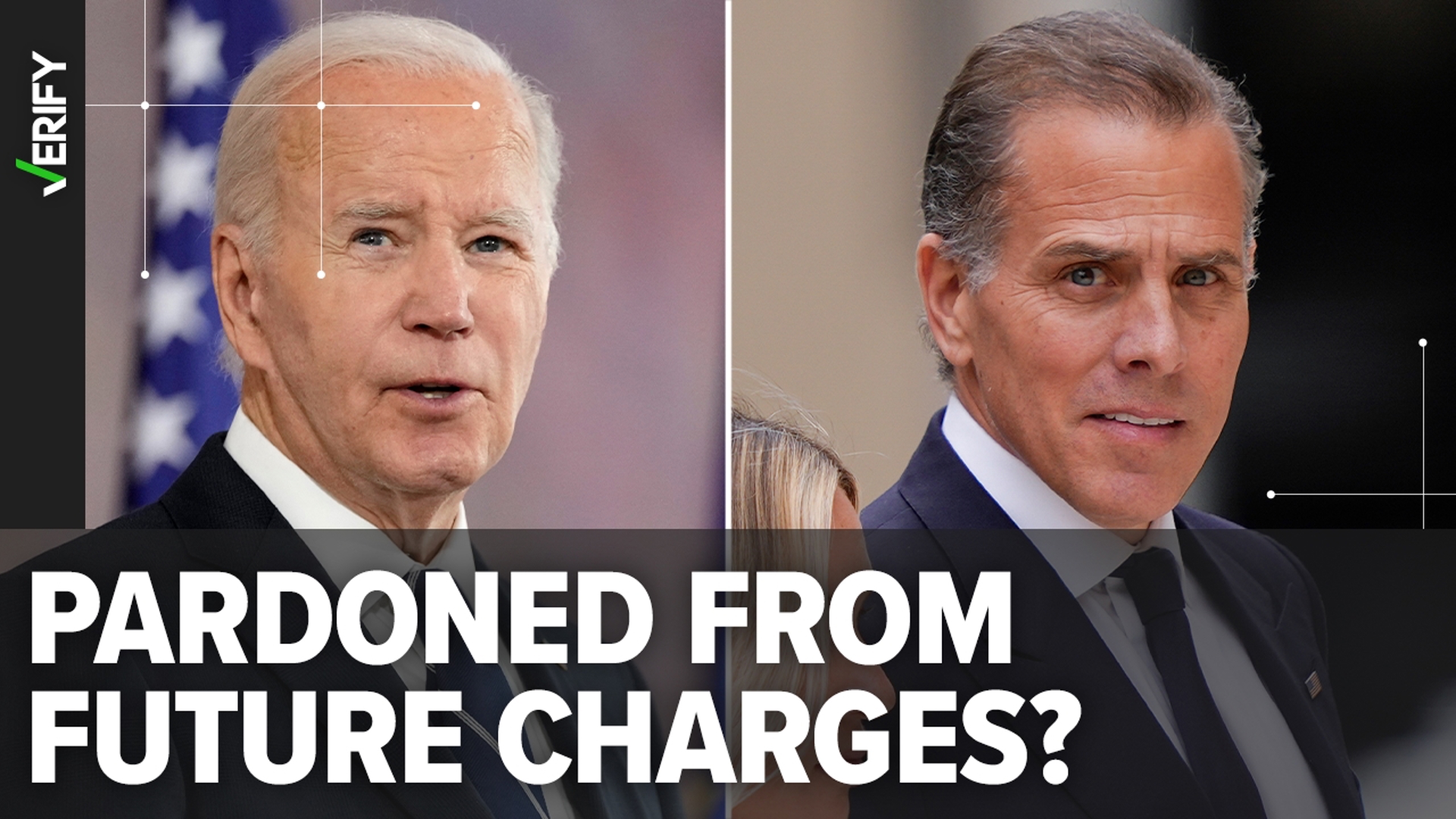President Joe Biden pardoned his son, Hunter, on Dec. 1, sparing the younger Biden a possible prison sentence for federal felony gun and tax convictions. The president previously said he would not pardon his son or commute his sentence but ultimately changed his mind.
In a statement released Sunday evening, Biden said, “I believe in the justice system, but as I have wrestled with this, I also believe raw politics has infected this process and it led to a miscarriage of justice.”
The president’s sweeping pardon covers not just the gun and tax offenses against Hunter Biden, but also any other “offenses against the United States which he has committed or may have committed or taken part in during the period from January 1, 2014 through December 1, 2024.”
Recent online search trends show many people are curious about how broad presidential pardons can be. Multiple VERIFY readers, including Linda and Neva, emailed us to ask if a president can pardon someone for a crime they haven’t actually been charged with.
THE QUESTION
Can a president pardon someone for a crime they have not been charged with?
THE SOURCES
THE ANSWER
Yes, a president can pardon someone for a crime they have not been charged with.
WHAT WE FOUND
Under the U.S. Constitution, the president has broad power to pardon someone before they are indicted, convicted or sentenced for a federal offense against the United States. This means a person can be pardoned for crimes they haven’t actually been charged with. However, a pardon cannot apply to future conduct, only past offenses.
Article II, Section 2, Clause 1 of the Constitution reads:
“The President shall be Commander in Chief of the Army and Navy of the United States, and of the Militia of the several States, when called into the actual Service of the United States; he may require the Opinion, in writing, of the principal Officer in each of the executive Departments, upon any Subject relating to the Duties of their respective Offices, and he shall have Power to grant Reprieves and Pardons for Offences against the United States, except in Cases of Impeachment.”
The U.S. Supreme Court has recognized the president’s broad pardon power as far back as 1866. In the case, Ex parte Garland, the Supreme Court described a president’s authority to pardon as “unlimited except in cases of impeachment, extending to every offence known to the law and able to be exercised either before legal proceedings are taken, or during their pendency, or after conviction and judgment.”
The Supreme Court also indicated in Ex parte Garland that the power may be exercised at any time “after [an offense’s] commission.” This means a president can issue a pardon at any point after a crime is committed and before, during or after criminal proceedings have taken place, according to SCOTUSBlog. The president cannot, however, pardon someone for future crimes.
In 1974, the Supreme Court also wrote that the broad power conferred in the Constitution gives the president plenary authority to “forgive [a] convicted person in part or entirely, to reduce a penalty in terms of a specified number of years or to alter it with certain conditions.”
President Biden’s “full and unconditional pardon” for Hunter insulates his son from facing federal charges for any crimes he may have committed from Jan. 1, 2014 through Dec. 1, 2024. But it does not extend to any federal crimes Hunter might commit in the future.
The Justice Department’s Office of the Pardon Attorney says pardons this broad are rare, but this isn’t the first example in American history.
A similarly broad pardon was issued by then-President Gerald Ford to former President Richard Nixon following Nixon’s resignation after the Watergate scandal. Ford’s pardon extended to “all offenses against the United States” that Nixon “has committed or may have committed” between Jan. 20, 1969, and Aug. 9, 1974 — the exact span of Nixon’s presidency.
The Associated Press contributed to this report.
This story is also available in Spanish / Lee este artículo también en español: Sí, un presidente puede indultar a alguien por crímenes por los que aún no ha sido realmente acusado

